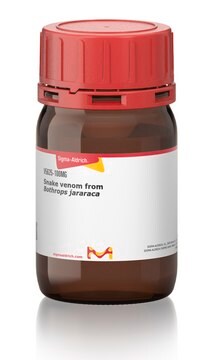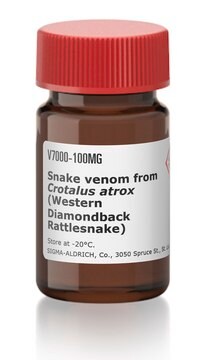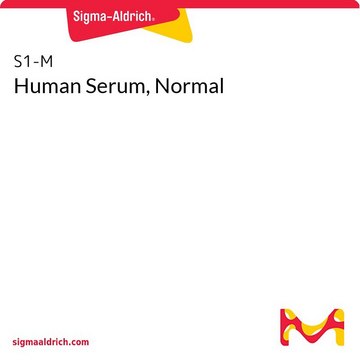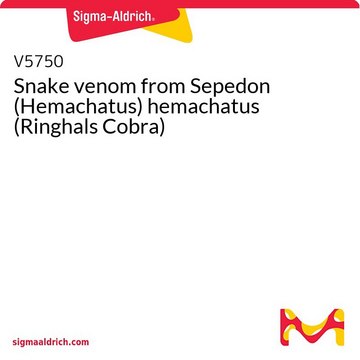233552-M
Cobra Venom Factor, Naja naja kaouthia
Cobra Venom Factor, Naja naja kaouthia, is a native cobra venom factor. Glycoprotein composed of three non-identical disulfide-bonded subunits of 68, 48, and 30 kDa.
Sinonimo/i:
Cobra Venom Anticomplementary Protein
Autenticatiper visualizzare i prezzi riservati alla tua organizzazione & contrattuali
About This Item
Codice UNSPSC:
12352202
Prodotti consigliati
Livello qualitativo
Saggio
≥95% (SDS-PAGE)
Stato
liquid
Attività specifica
≥250 units/mL
Produttore/marchio commerciale
Calbiochem®
Condizioni di stoccaggio
OK to freeze
avoid repeated freeze/thaw cycles
Attività estranea
Phospholipase, none detected
Temperatura di conservazione
−70°C
Descrizione generale
Native cobra venom factor from Naja naja kaouthia. Glycoprotein composed of three non-identical disulfide-bonded subunits with M.W. of 68 kDa (α), 48 kDa (β), and 30 kDa (γ). Cobra venom factor (CVF) is a structural and functional analog of cobra, as well as mammalian C3. Thus, in the presence of Factor B, Factor D, and Mg2+, CVF can form a stable CVF,Bb complex that is a C3/C5 convertase enzyme; however, the CVF,Bb complex is not susceptible to regulation by Factors H and I. Four to six µg of purified CVF are equal to 1.0 unit of functional activity as measured by the method of Cochrane, et al.
Native cobra venom factor from Naja naja kaouthia. Glycoprotein composed of three nonidentical disulfide-bound subunits with M.W. of 68,000 (α), 48,000 (β), and 30,000 (γ). Cobra Venom Factor (CVF) is a structural and functional analog of cobra, as well as mammalian C3. In the presence of Factor B, Factor D, and Mg2+, CVF can form a stable CVF, Bb complex which is a C3/C5 convertase enzyme; however, the CVF,Bb complex is not susceptible to regulation by Factors H and I. Four to six µg of purified CVF is equal to 1.0 unit of functional activity as measured by the method of Cochrane, et al.
Attenzione
Toxicity: Harmful (C)
Altre note
Bogers, W.M., et al. 1993. Eur. J. Immunol.23, 433.
Fritzinger, D.C., et al. 1992. J. Immunol. 149, 3554.
Muller, B. and Muller-Ruchholtz, W. 1987. Leuk. Res.11, 461.
Vogel, C.W. and Muller-Eberhard, H.J. 1984. J. Immunol. Methods73, 203.
Cochrane, C.G., et al. 1970. J. Immunol. 105, 55.
Ballows, M. and Cochrane, C.G. 1969. J. Immunol.103, 944.
Fritzinger, D.C., et al. 1992. J. Immunol. 149, 3554.
Muller, B. and Muller-Ruchholtz, W. 1987. Leuk. Res.11, 461.
Vogel, C.W. and Muller-Eberhard, H.J. 1984. J. Immunol. Methods73, 203.
Cochrane, C.G., et al. 1970. J. Immunol. 105, 55.
Ballows, M. and Cochrane, C.G. 1969. J. Immunol.103, 944.
Note legali
Not available for sale outside the United States.
CALBIOCHEM is a registered trademark of Merck KGaA, Darmstadt, Germany
Codice della classe di stoccaggio
12 - Non Combustible Liquids
Classe di pericolosità dell'acqua (WGK)
WGK 2
Punto d’infiammabilità (°F)
Not applicable
Punto d’infiammabilità (°C)
Not applicable
Certificati d'analisi (COA)
Cerca il Certificati d'analisi (COA) digitando il numero di lotto/batch corrispondente. I numeri di lotto o di batch sono stampati sull'etichetta dei prodotti dopo la parola ‘Lotto’ o ‘Batch’.
Possiedi già questo prodotto?
I documenti relativi ai prodotti acquistati recentemente sono disponibili nell’Archivio dei documenti.
Il team dei nostri ricercatori vanta grande esperienza in tutte le aree della ricerca quali Life Science, scienza dei materiali, sintesi chimica, cromatografia, discipline analitiche, ecc..
Contatta l'Assistenza Tecnica.








